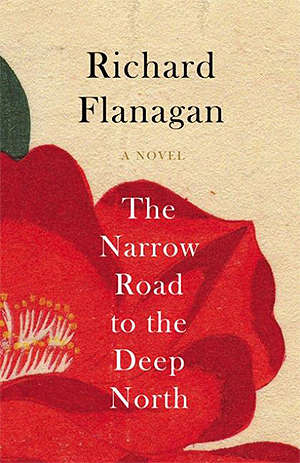Published by Chatto & Windus, 2014, hardcover, 488 pages, condition: as new.
A novel of the cruelty of war, and tenuousness of life and the impossibility of love.
Richard Flanagan's story of Dorrigo Evans, an Australian doctor haunted by a love affair with his uncle's wife journeys from the caves of Tasmanian trappers in the early twentieth century to a crumbling pre-war beachside hotel, from a Thai jungle prison to a Japanese snow festival, from the Changi gallows to a chance meeting of lovers on the Sydney Harbour Bridge.
Taking its title from 17th-century haiku poet Basho's travel journal, The Narrow Road To The Deep North is about the impossibility of love. At its heart is one day in a Japanese slave labour camp in August 1943. As the day builds to its horrific climax, Dorrigo Evans battles and fails in his quest to save the lives of his fellow POWs, a man is killed for no reason, and a love story unfolds.
Richard Flanagan (born 1961) is an author, historian and film director from Tasmania, Australia. He was president of the Tasmania University Union and a Rhodes Scholar. Each of his novels has attracted major praise. His first, Death of a River Guide (1994), was short-listed for the Miles Franklin Award, as were his next two, The Sound of One Hand Clapping (1997) and Gould's Book of Fish (2001). His earlier, non-fiction titles include books about the Gordon River, student issues, and the story of conman John Friedrich.
A finalist for this years Man Booker Prize, The Narrow Road to the Deeper North portrays a singular episode of manic brutality: imperial Japans construction of the Thailand-Burma Death Railway in the early 1940s. The British had long investigated this route, but they deemed the jungle impenetrable. Once the Japanese captured Burma, though, its army needed a more efficient resupply route, and so the impossible became possible in just over a year by using some 300,000 people as disposable labor. Flanagans late father was a survivor of that atrocity, which took the lives of more than 12,000 Allied prisoners. I had known for a long time that this was the book I had to write if I was to keep on writing, Flanagan said recently. Other novels came and went as I continued to fail to write this one. Those other novels that he refers to so modestly include his 2001 masterpiece, Goulds Book of Fish, which also dealt with the unfathomable abuse of prisoners. But the horrors of that story about a 19th-century convict kept in a partially submerged cage in Tasmania were leavened by ribald humor and a style so lush that the sentences seemed to send tendrils off the pages, which were printed in several different colors. The Narrow Road to the Deep North sports none of that dazzling showmanship. Its magic is darker and more subtle, its impact more devastating. Here, Flanagan is writing about events that outstrip surrealism.

